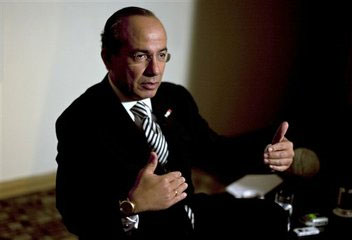
|  |  |  News Around the Republic of Mexico News Around the Republic of Mexico  
Calderon Sees a Drug War Success
 Elliot Spagat - Associated Press Elliot Spagat - Associated Press
go to original
October 08, 2010


| | Mexico's President Felipe Calderon speaks during an interview with The Associated Press in Tijuana, Mexico, Thursday, Oct. 7, 2010. (AP/Guillermo Arias) |  |
Tijuana, Mexico — President Felipe Calderon calls Tijuana a success in his four-year-old war on drug cartels, though he is unsure that making the border city safer has reduced the flow of drugs to the United States.

In an interview with The Associated Press, the Mexican leader noted that many of the city's crime bosses have been captured in the past two years and said far fewer residents are being kidnapped and extorted. A key ingredient to its success, he said, is that its people trust authorities to help keep them safe - more than in other cities plagued by violence.

"Tijuana went from being a city seized by terror and focused only on questions of crime to a city motivated by hope and focused on being competitive," Calderon said late Thursday.

Calderon took some credit, saying authorities from different levels of government work together more closely than in other parts of the country. But he said Tijuana, which borders San Diego, sets itself apart largely by the spirit of its people.

"It would be unfair to claim that the people have hope because of the government," he said.

Calderon drew a sharp contrast with Ciudad Juarez, where violence between rival gangs has spun out of control across the border from El Paso, Texas. He said local authorities have unfairly blamed him for the city's problems, even after he dispatched thousands of troops and federal police into the city in 2008 to defuse a showdown between Sinaloa cartel kingpin Joaquin "El Chapo" Guzman and Juarez cartel boss Vicente Carrillo Fuentes.

"In Ciudad Juarez, unfortunately, there has not been the same degree of collaboration and constructive attitude that we have found in other places, like Tijuana," he said. "Instead of everyone working together, they preferred the easy way out by blaming everything on the federal government and the president."

More than 28,000 people have died in drug violence since Calderon launched his crackdown on organized crime in late 2006.

Tijuana is emerging from the most violent spell in its history, marked by shootouts between rival gangs, decapitated bodies dumped near schools and soccer fields and mutilated corpses hung from freeway bridges. The carnage was the product of a showdown between two crime bosses - Fernando "The Engineer" Sanchez Arellano and Teodoro "El Teo" Garcia Simental, a renegade lieutenant who rose through the ranks by dissolving bodies in vats of lye.

Even before Garcia was arrested by Mexican authorities in January, some signs of normalcy had returned. Restaurants got busier. A vibrant nightclub scene emerged near the city's main tourist drag, Avenida Revolucion.

Calderon said Tijuana's peace is precarious and acknowledged that the city's murder rate has risen this year. Still, he noted that the murder rate is below a record high in 2008 and that assassinations of police officers have almost stopped after dozens were gunned down last year in the line of duty.

Nuevo Laredo, along the Texas border, also settled into a period of calm after a horrific wave of violence in 2005 only to see killings surge again recently in a battle between Gulf cartel and the Zetas, a breakaway drug gang made up of former Mexican special forces soldiers.

Calderon said Tijuana appears different than Nuevo Laredo and other cities along the Texas border, where he suggested the fleeting peace resulted from a temporary arrangement between criminal organizations.

"That zone in the north - (Nuevo) Laredo, Matamoros, Reynosa - was in peace and nothing happened. Yes, but the moment that the Gulf cartel and its (former) associates, the Zetas, start fighting ... there's a tremendous bloodbath," he said.

Calderon said the only recipe for lasting peace is a strong government that enjoys the support of its people.

"It's the most costly path in terms of time, money and loss of lives," he said.

Calderon said he didn't know if the sense of calm in Tijuana has resulted in fewer drugs being smuggled from there into California.

"The reality is that while the United States continues to consume drugs, drug trafficking will not go away," he said. "The surveys on drug use in the United States are truly disappointing. Instead of a reduction, there is an increase."

He was sharply critical of a Nov. 2 ballot measure in California that would legalize possession of small quantities of marijuana and pave the way for local governments to allow retail sales of the drug, saying it reflects a "terrible inconsistency" in U.S. drug policy.

"They have exerted pressure and demanded for decades that Mexico and other countries control, reduce and fight drug trafficking, and there is no discernible effort to reduce the consumption of drugs in the United States," he said.

Associated Press Writer Katherine Corcoran contributed to this report.
|

 |
|  |



